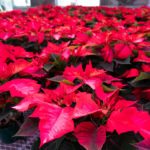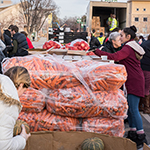
Editor’s note: This article is by Emily Nardone, former practicum student at the Kendall Reagan Nutrition Center
In many places, including Colorado, Georgia and California, peaches are in peak season throughout the summer months. Colorado peaches are especially well-loved and famous. As peaches are now at the forefront of many farmers’ markets and grocery store produce sections, we’re celebrating our favorite Colorado peaches by sharing peach nutrition information, preservation tips, and preparation ideas.
What makes Colorado peaches so good?
Colorado peaches are known for being extra juicy and sweet! They are grown throughout the state’s Western Slope, and are most famously from a small town called Palisade. The Western Slope is perfect for growing famous Palisade Peaches due to its temperate microclimate that includes warm winds from the mesas, long summer days, and cool summer nights. This area is also known for growing other fruits throughout the summer months, including pears, apricots, cherries and grapes. These plentiful and delicious fruits are why Palisade is often referred to as the “fruit basket of Colorado.”
Fun facts about Palisade:
- There are more than 25 peach-growing farms in Palisade
- The majority of these farms are family-run businesses
- Many farms offer tours to the public
What makes peaches nutritious?
No matter what variety of peach you enjoy (there are more than 300 grown in North America alone), you can expect this fruit to be packed with nutrients. Fresh peaches are a good source of vitamin C, vitamin A and antioxidants. Your body has many uses for vitamin C, including building connective tissue, helping the immune system function properly, and acting as an antioxidant. Antioxidants help protect the body against harmful free radicals that can play a role in the development of many chronic diseases (read more about antioxidants here). Vitamin A also plays many roles in the body, including promoting healthy eyesight and tissue (skin and mucus membranes).
One medium raw peach also provides 2 grams of fiber, which is good for the digestive system.
Additionally, peaches provide small amounts of other vitamins and minerals, including vitamins E and K, iron, and potassium.
Preservation tips
What can you do with your delicious peaches once you bring them home? If you’d like to eat them as soon as possible, it is best to leave them on your counter at room temperature until they ripen. To quicken the ripening process, you can place the peaches in a sealed paper bag. This traps peach’s natural gas (ethylene gas) that speeds up the ripening process. How will you know when they’re ready to eat? Peaches become ripe once they get soft and have some “give” as you press into the skin. If you want to wait a few days to eat your peaches, place them in a loosely sealed plastic bag and leave them in the fridge until ready to eat. They should last for about 5-7 days in the fridge.
Want maximal storage potential? You can also freeze ripe peaches! Before placing them in the freezer, slice the peaches, let them completely freeze on a baking sheet, and then store them frozen in a plastic bag until ready to eat.
You can also try canning, drying, and even making your own peach jam!
Prep tips and recipes
While you might enjoy eating a delicious peach on its own, there are also endless ways to incorporate peaches into other recipes! One of our favorites is our recipe of the month: peach frozen yogurt! This is the perfect treat on a hot summer day. If you don’t want to stop there, check out these other ways to prepare peaches:
- Make your own peach cobbler or fruit crisp
- Layer peach slices with Greek yogurt and other fruits/toppings to make a parfait
- Add peaches to a fresh summer salad
- Grill night? Make grilled peaches! Check out our Balsamic GrilledPeaches recipe on our Appetizers page
- Taco night? Make your own peach salsa!
- Pineapple on pizza will always be up for debate, but how about a peach pizza?
We hope you have the opportunity to get creative with peaches and enjoy this nutritious summer staple and remember to freeze some for winter.
Kendall Reagan Nutrition Center
The mission of the Kendall Reagan Nutrition Center is to provide service-learning opportunities and training for students in the Department of Food Science and Human Nutrition while enhancing the health of the Colorado community through nutrition outreach, collaboration, and research.”



































































































